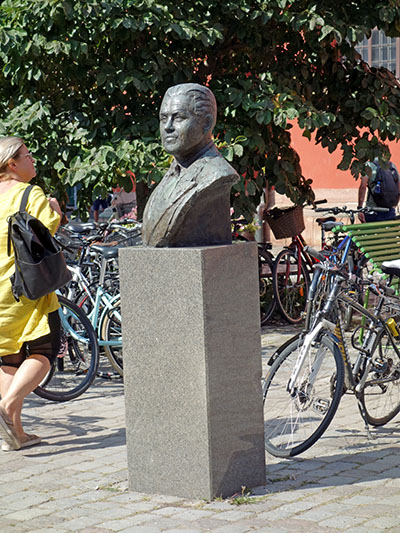Jussi Björling
2 February 1911 Borlänge – 9 September 1960 Siarö
Tosca 1957
Jussi Björling – Commented record list, by Daniele Godor
In RA format
| Jussi Björling sings | La belle Hélène: Au Mont Ida, in Swedish
|
In RA format
In RA format
In RA format
I wish to thank Daniele Godor for the pictures (Tosca and bottom), and the Belle Hélène and Lohengrin recordings.
I would like to thank Thomas Silverbörg for the other recordings.
Jussi Björling as a baritone
Jussi (officially Johan Jonatan) Björling is one of those singers whose biographies are
so readily available that a site like this can hardly add anything new, so a brief summary may suffice.
Destined by his father David, already from childhood, to become a singer, he was one of the popular singing Björling children
(touring Sweden and the USA together with his brothers and his father as the Björlingkvartetten); his teachers were his
father first, and John Forsell and Tullio Voghera after his father's death. That may sound smoother than it actually was; when
David Björling died, Jussi was only 15, and the mother had died long before, so he was on his own and had to earn money for
a living. He worked in an appliance store in Ystad, then washed taxi cabs in Stockholm at night until he was accepted by
Forsell and could continue his vocal studies.
Operatic debut: Royal Opera House Stockholm, 1930; he remained a member of that theater until 1939, and a regular guest there
until his death. His first major success was a concert in Copenhagen in 1931; in 1936/37, he sang in Prague, Nürnberg,
Dresden, at the Deutsche Oper Berlin and, particularly successful, at the Vienna State Opera. In 1937, he made his US debut at
Carnegie Hall. From 1938 to early 1941, and from late 1945 to 1959, he spent much of his time at the Metropolitan Opera, while
also continuously appearing in Sweden, primarily in Stockholm (during the war years 1941 to 1945, exclusively there, with only
one guest appearance in Florence in 1943). Other than to and from New York, Björling didn't travel a lot; he only appared
in London (Covent Garden in 1939 and 1960, Royal Albert Hall for several concerts from 1951), Lucerne (1939), La Scala (1946
and 1951), San Francisco (1940 and 1960) and Chicago (regularly after 1955).
He was a heavy alcoholic throughout his life (he is said to have started drinking to combat stage fright), and he developed a
heart disease in the 1950s. Other than with so many other singers, his drinking never influenced his professional discipline, and
it wasn't even detrimental to his voice, thanks to his superb vocal technique. In the 1950s, he had persistent vocal problems,
but they were obviously neither related to his heart condition nor to his alcoholism, but to overstrain and resulting
laryngitis. He eventually recovered, and the recordings from his last year are certainly among his best.
Reference 1: Jussi Björling Society,
reference 2: Kutsch & Riemens, reference 3, reference 4
 Jussi Björling memorial behind the Royal Opera House Stockholm
Jussi Björling memorial behind the Royal Opera House Stockholm
Repertory
Bellman – Stockholm, 1 July 1930
Manon Lescaut (Lamplighter) – Stockholm, 21 July 1930
Don Giovanni – Stockholm, 20 August 1930
Louise – Stockholm, 29 November 1930
Guillaume Tell – Stockholm, 27 December 1930
Saul og David – Stockholm, 13 January 1931
Engelbrekt – Helsinki, 21 March 1931
I cavalieri di Ekebù (Ruster) – Stockholm, 19 April 1931
Tannhäuser (Walther) – Stockholm, 8 August 1931
Roméo et Juliette (Tybalt) – Stockholm, 30 August 1931
Der fliegende Holländer – Stockholm, 29 September 1931
La notte di Zoraima – Stockholm, 16 October 1931
Il barbiere di Siviglia – Stockholm, 7 November 1931
Salome (Narraboth) – Stockholm, 29 december 1931
L'illustre Fragona – Stockholm, 16 January 1932
Tristan und Isolde (Seemann) – Stockholm, 15 February 1932
Rigoletto – Chicago, 25 February 1932
Das Herz – Stockholm, 14 April 1932
Mignon – Stockholm, 8 October 1932
L'elisir d'amore – Stockholm, 9 November 1932
Resa till Amerika (by Hilding Rosenberg) – Stockholm, 24 November 1932 (world premiere)
La traviata – Stockholm, 5 January 1933
Evgenij Onegin – Stockholm, 14 January 1933
Das Rheingold – Stockholm, 17 January 1933
Knjaz Igor – Stockholm, 11 March 1933
Kronbruden – Stockholm, 6 April 1933
Roméo et Juliette (Roméo) – Los Angeles, 22 August 1933
Martha – Stockholm, 3 September 1933
Djamileh – Stockholm, 6 September 1933
Tosca – Stockholm, 19 October 1933
Die Zauberflöte – Malmö, 15 December 1933
Fanal (by Kurt Atterberg) – Stockholm, 27 January 1934 (world premiere)
Un ballo in maschera – Stockholm, 18 April 1934
Faust – San Francisco, 25 August 1934
La bohème – London, 13 October 1934
Il tabarro – Stockholm, 20 October 1934
Sadko – Stockholm, 17 November 1934
La fanciulla del West – Vienna, 29 December 1934
Arabella – Stockholm, 30 December 1934
Die Entführung aus dem Serail – Stockholm, 26 January 1935
Cavalleria rusticana – New York, 14 February 1935
Fidelio – Stockholm, 26 March 1935
Il trovatore – San Francisco, 17 August 1935
Die Fledermaus – Stockholm, 17 September 1935
Aida – Chicago, 12 October 1935
Pagliacci – Stockholm, 11 January 1936
La damnation de Faust – Stockholm, 1 February 1936
Madama Butterfly – Stockholm, 5 September 1936
La fille du régiment – Stockholm, 26 September 1936
Rossini in Neapel – Stockholm, 26 November 1936
Mefistofele – Stockholm, 30 September 1937
Der Zigeunerbaron – Stockholm, 4 April 1938
L'Africaine – Stockholm, 4 October 1938
Manon Lescaut – San Francisco, 7 October 1947
Don Carlo – New York, 6 November 1950
Reference: Björling/Farkas: Jussi, Amadeus Press, 1996
Reference: Harald Henrysson: A Jussi Björling phonography, Svenskt Musikhistorisk Archiv, Taberg (Sweden, 1993)
Go Home
|